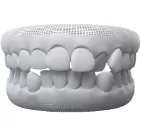Temporomandibular Joint (TMJ) disorder is a condition that affects the jaw joint and surrounding muscles, causing discomfort, pain, and difficulty in chewing and speaking. Many people with TMJ disorder experience worsened symptoms while sleeping, often waking up with jaw pain, headaches, or facial tension. Since improper sleeping positions can put additional strain on the jaw, finding the right way to sleep is crucial for minimizing pain and promoting better jaw alignment.
If you suffer from TMJ pain, making small adjustments to your sleeping position can have a significant impact on your comfort and recovery. In this article, we will explore the best and worst sleeping positions for TMJ sufferers, along with useful tips for improving sleep quality and reducing jaw discomfort.
How Sleeping Position Affects TMJ Pain
Your sleeping position plays a major role in jaw alignment, muscle tension, and overall comfort. Sleeping in the wrong posture can increase pressure on the jaw joint, leading to stiffness and pain in the morning. Many TMJ sufferers unknowingly clench their jaw or grind their teeth during sleep, worsening the condition. The goal is to find a neutral, relaxed position that reduces stress on the jaw and allows the muscles to rest.
People with TMJ disorder should avoid sleeping in positions that put pressure on the jaw or misalign the neck. Instead, focusing on supportive sleeping postures can help improve symptoms and prevent further irritation.
Best Sleeping Positions for TMJ Disorder
1. Sleeping on Your Back (Best Position)
The best sleeping position for TMJ disorder is lying on your back with proper neck and head support. This position:
- Keeps the jaw in a neutral position, preventing unnecessary strain on the temporomandibular joint.
- Reduces the risk of teeth grinding and clenching, which are common triggers for TMJ pain.
- Prevents uneven pressure on one side of the jaw, allowing the muscles to relax.
For maximum comfort, use a supportive pillow that keeps your neck and spine aligned. Avoid using overly thick or high pillows, as they can push the head forward and create tension in the jaw. A contoured memory foam pillow can provide excellent support and promote relaxation.
2. Sleeping on Your Side with Proper Support
If sleeping on your back is not comfortable, the second-best option is sleeping on your side with proper pillow support. Side sleeping can be beneficial for TMJ disorder if you:
- Use a firm pillow to keep the head, neck, and spine aligned.
- Avoid sleeping with direct pressure on the affected jaw, as this can cause increased pain.
- Keep a small pillow or rolled towel between your shoulder and jaw to prevent compression.
Side sleepers should be mindful of not resting directly on the jaw. If one side of your jaw is more painful, try sleeping on the opposite side to reduce pressure and discomfort.
Worst Sleeping Positions for TMJ Disorder
1. Sleeping on Your Stomach (Worst Position)
Stomach sleeping is the worst position for TMJ disorder because it forces the head to be turned to one side for long periods. This position:
- Puts excessive pressure on the jaw, leading to morning stiffness and pain.
- Misaligns the neck and spine, increasing tension in the jaw muscles.
- Can cause jaw clenching and teeth grinding, worsening TMJ symptoms.
If you are used to sleeping on your stomach, try transitioning to back or side sleeping for better jaw support. Using a body pillow or wedge pillow can help keep you from rolling onto your stomach during the night.
2. Sleeping with Your Hand Under Your Jaw
Many people unknowingly rest their head on their hand while sleeping, which can put pressure on the jaw and worsen TMJ pain. This position can:
- Push the jaw out of alignment, increasing muscle tension.
- Cause uneven pressure on one side of the face, leading to pain and stiffness.
- Restrict blood flow, making the jaw feel tight and sore upon waking.
To prevent this, try using a supportive pillow that cradles the head and neck, keeping your hands away from the jaw area.
Additional Tips for Sleeping Comfortably with TMJ Disorder
1. Use a Supportive Pillow
A high-quality pillow can make a significant difference in reducing TMJ discomfort. Memory foam or orthopedic pillows help maintain proper alignment and prevent unnecessary strain on the jaw. Avoid using overly soft pillows that fail to provide adequate neck and head support.
2. Try a Nightguard for Teeth Grinding
Many TMJ sufferers experience bruxism (teeth grinding) while sleeping, which can worsen jaw pain. A custom-made nightguard from your dentist can help:
- Prevent teeth grinding and jaw clenching.
- Reduce strain on the temporomandibular joint.
- Protect the teeth from wear and damage.
Wearing a nightguard regularly can help relieve symptoms and prevent further complications.
3. Apply a Warm Compress Before Bed
A warm compress or heating pad applied to the jaw before bedtime can relax tense jaw muscles and improve blood circulation. This can help reduce pain and stiffness, allowing for a more comfortable night’s sleep.
4. Maintain Good Sleep Hygiene
Creating a relaxing bedtime routine can improve sleep quality and help manage TMJ symptoms. Try the following:
- Avoid caffeine and heavy meals before bed to prevent muscle tension.
- Practice gentle jaw stretches or relaxation exercises to reduce stress.
- Sleep in a quiet, dark environment to promote restful sleep.
Poor sleep can increase stress and muscle tension, leading to worsened TMJ pain. Prioritizing good sleep habits can help improve symptoms over time.
When to See a Dentist for TMJ Treatment
If your TMJ pain persists or worsens despite adjusting your sleeping position, it is important to seek professional treatment. A dentist specializing in TMJ disorders can:
- Evaluate your jaw alignment and symptoms.
- Provide custom nightguards or splints to prevent teeth grinding.
- Offer physical therapy exercises to strengthen jaw muscles.
- Recommend advanced treatments such as laser therapy or Botox injections for pain relief.
At Mint Dental Care in Dubai, we offer comprehensive TMJ treatments to help patients manage pain and improve jaw function. Our experienced specialists provide customized solutions to address your specific TMJ needs.
Conclusion
Sleeping in the right position is essential for reducing TMJ pain and preventing further strain on the jaw. The best sleeping positions for people with TMJ disorder are on the back or side with proper pillow support, while stomach sleeping and resting your hand under your jaw should be avoided. In addition to adjusting your sleeping posture, using a nightguard, warm compress, and supportive pillow can help improve comfort and alleviate symptoms.
If you continue to experience chronic TMJ pain, seeking professional care is the best way to find long-term relief. At Mint Dental Care in Dubai, we offer advanced TMJ treatments to help you sleep better and live pain-free.
Call us today to schedule a consultation and find the best TMJ treatment for you!















